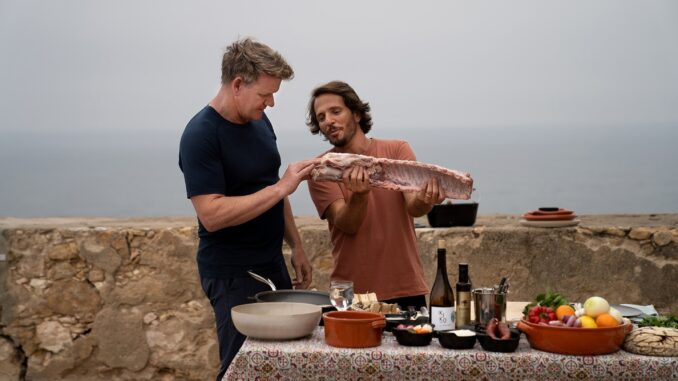
Before transferring a Portuguese cake from its copper baking pan to a cake box, Gordon Ramsay takes a deep breath. Dating to the 1700s, the Pão de Ló is a sponge cake that’s removed from the oven early, to retain a slightly undercooked, gooey center. That means steady hands and great care when handling the cake before it ultimately gets to the dessert plate. “It’s all liquid in the center, so it’s a difficult dismount,” he says. “I have to be so careful doing it. Taking those things out of the oven, trust me, it’s difficult.”
One of the most powerful seafaring countries in the world that monopolized the spice trade in the 16th century, Portugal and its cuisine have benefited from the ingredients obtained from trade routes. But the roots of Portuguese gastronomy also include a focus on native ingredients’ pure flavors. “Portugal is about simplicity and the quality of its products,” says Chef Kiko Martins, celebrated Portuguese chef who studied at the Cordon Bleu and honed his skills in Michelin-starred kitchens across Europe. “For many generations, we have dedicated time in our families speaking about food. When we’re at lunch, we talk about what’s going to be for dinner. When we’re having dinner, we talk about what we’ll have for lunch the next day.”


In this southwestern corner of the Iberian peninsula, the wind-lashed shores and rugged landscape give birth to Portugal’s adventurous spirit that’s influenced its people and cuisine. Martins informs Ramsay that at the end of the week, they’ll cook together for the mayor of Nazaré, a coastal town that’s home to some of the biggest surfable waves on the planet. “Everything that comes from this ocean is amazing,” says Martins. “That’s what makes Portugal so special.” But with their dishes, it’s simplicity that counts. Martins’ last advice to Ramsay: “Make it pure.”
With more than 1,100 miles of coastline, Portugal relies heavily on seafood from the Atlantic Ocean and the Portuguese take care to preserve the beautiful taste of the ocean in cooking. As tasty as they are ugly, percebes (also known as gooseneck barnacles) thrive in the dangerous surf on the country’s rocky coast and their extraordinary price is reflected in the risk that’s required to forage for them. The sardine is an essential part of the cultural and economic fabric of Portugal, a staple of the area’s diet and trade ever since the Romans found its abundant schools off the coast. The vineyards of Colares, with some of the oldest vines in Portugal, wind along the sand, influenced by the Atlantic just as they have been for centuries. Iberian black pigs roam the oak forests of the country’s Alentejo region for acorns—instrumental in the resulting succulent porco preto being marbled with fat.
The fearless, hearty attitude of the Portuguese appeals to Ramsay’s inner adventurer. “Portugal has been an amazing eye-opener,” he says. “I’ve really tapped into the bold spirit of the Portuguese way, and understanding that less is more. Keep it simple.”
